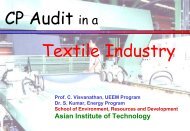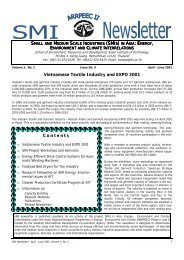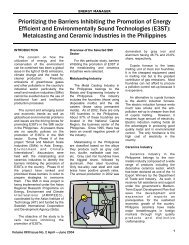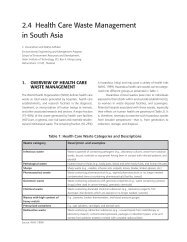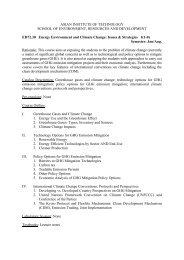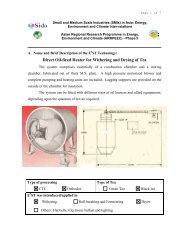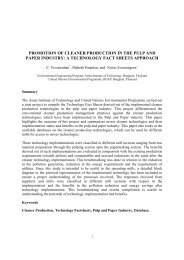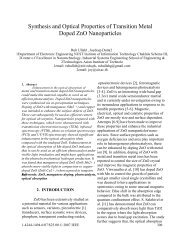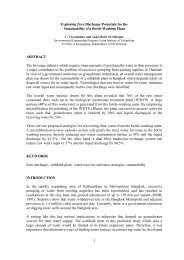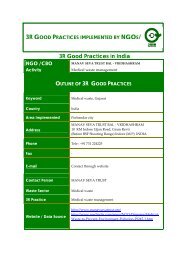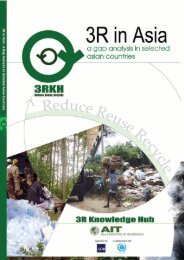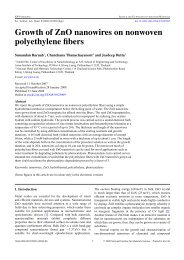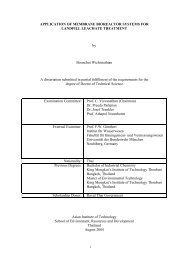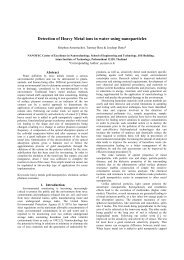Issue 6 - faculty.ait.ac.th - Asian Institute of Technology
Issue 6 - faculty.ait.ac.th - Asian Institute of Technology
Issue 6 - faculty.ait.ac.th - Asian Institute of Technology
You also want an ePaper? Increase the reach of your titles
YUMPU automatically turns print PDFs into web optimized ePapers that Google loves.
Small Small and and Medium Medium Medium Scale Scale Industries Industries (SMIs) (SMIs) in in Asia: Asia: Energy, Energy,<br />
Energy,<br />
Environment Environment and and Climate Climate Climate Interrelations<br />
Interrelations<br />
School <strong>of</strong> Environment, Resources and Development, <strong>Asian</strong> <strong>Institute</strong> <strong>of</strong> <strong>Technology</strong>, PO Box 4, Klong Luang,<br />
Pa<strong>th</strong>um<strong>th</strong>ani 12120, Thailand<br />
Fax: (66) (2) 524-5439, Tel: (66)(2) 524-5432/524-5470, Email: smiasia@<strong>ait</strong>.<strong>ac</strong>.<strong>th</strong><br />
Volume 2, No. 3 <strong>Issue</strong> No. 6<br />
July – September 2000<br />
Workshop on Policies to Promote E 3 ST in Selected SMIs,<br />
30 May 2000, Beijing, China<br />
A workshop was held on “Policies to promote energy efficient<br />
and environmentally sound technologies (E 3 STs) in selected<br />
small and medium scale industries (SMIs)”, Beijing, China on<br />
30 May 2000. The objective <strong>of</strong> <strong>th</strong>e meeting was to discuss <strong>th</strong>e<br />
various aspects <strong>of</strong> <strong>th</strong>e governmental policies regarding SMIs<br />
and <strong>th</strong>e promotion <strong>of</strong> E 3 STs for SMIs in China. It was organised<br />
jointly by Center <strong>of</strong> Environmentally Sound <strong>Technology</strong><br />
Transfer (CESTT) and <strong>Asian</strong> <strong>Institute</strong> <strong>of</strong> <strong>Technology</strong> (AIT).<br />
The o<strong>th</strong>er participants were from The State Development<br />
Planning Commission, Tsinghua University, Ministry <strong>of</strong> Agriculture,<br />
and <strong>th</strong>e national research institutions from India (PSG<br />
College <strong>of</strong> <strong>Technology</strong>), Philippines (Industrial <strong>Technology</strong><br />
Development <strong>Institute</strong>), Sri Lanka (Industrial Services Bureau<br />
<strong>of</strong> Nor<strong>th</strong>western Province) and Vietnam (Non-State Economic<br />
Development Centre).<br />
Mr. Sun Zhen, Deputy Director <strong>of</strong> Department <strong>of</strong> Regional<br />
Economy Development, State Environmental Planning Commission,<br />
presented <strong>th</strong>e “Chinese Economic and Environmental<br />
Policy-Making Process”. He presented a matrix <strong>of</strong> environmental<br />
instruments showing <strong>th</strong>e role <strong>of</strong> <strong>th</strong>e various government<br />
agencies (Ministry <strong>of</strong> Development and Ministry <strong>of</strong> Environment),<br />
society and business in <strong>th</strong>e policy-making process,<br />
particularly environmental policy and SMI development. He<br />
discussed command and control instruments, economic policies<br />
and information dissemination and <strong>of</strong>fered observation<br />
on policy decision making process. Policy instruments to promote<br />
Cleaner Production (CP) and Small and Medium Scale<br />
Enterprises (SMEs) in China cover <strong>th</strong>e establishment <strong>of</strong> centers<br />
for CP and energy-environmental auditing. He noted <strong>th</strong>at<br />
Chinese government plans to establish laws on CP and will<br />
use market-based instruments as policy instruments to promote<br />
E 3 STs.<br />
Pr<strong>of</strong>. Wang Yanjia <strong>of</strong> Tsinghua University presented a study<br />
entitled “Energy Efficient and Environmentally Sound Industrial<br />
Technologies in China: Case <strong>of</strong> ARRPEEC-I, Industrial<br />
sectors”. The role <strong>of</strong> government, equipment suppliers, pub-<br />
lic, international organisations, private sector and general<br />
business environment in adopting E 3 STs in large-scale industrial<br />
sectors were studied. The present situation in China is<br />
char<strong>ac</strong>terised by open energy market, energy price reform,<br />
financial system reforms, environmental concern, and no interest<br />
on <strong>th</strong>e subsidies for energy-environment projects.<br />
Mr. Xu Huaquing, Deputy Director <strong>of</strong> Centre for Energy, Environment<br />
and Climate Change Rese<strong>ac</strong>h, Energy Research <strong>Institute</strong>,<br />
State Development Planning Commission, highlighted<br />
<strong>th</strong>e policies and its imp<strong>ac</strong>t on environment and energy saving<br />
technologies. The char<strong>ac</strong>teristics <strong>of</strong> SMIs in China, particularly<br />
brick and textile industries were illustrated. The policy instruments<br />
and policies for development, <strong>th</strong>e limitation <strong>of</strong> SMIs<br />
and <strong>th</strong>e policy outline for energy saving technologies in <strong>th</strong>e<br />
brick and textile SMIs were highlighted. The increasing specific<br />
energy consumption in <strong>th</strong>e brick industry and <strong>th</strong>e nature<br />
<strong>of</strong> <strong>th</strong>e clay brick production in China has prompted <strong>th</strong>e government<br />
to issue guidelines to close down SMIs employing<br />
<strong>th</strong>ose technologies which are having a serious imp<strong>ac</strong>t on <strong>th</strong>e<br />
environment in <strong>th</strong>e clay brick manuf<strong>ac</strong>turing sector. In textile<br />
industry, <strong>th</strong>e adoption <strong>of</strong> E 3 ST is <strong>th</strong>e result <strong>of</strong> market competition<br />
more <strong>th</strong>an government policy.<br />
Ms. Cai Li, Deputy Director <strong>of</strong> TVEs Administation Bureau,<br />
Ministry <strong>of</strong> Agriculture, in her presentation on “Adoption <strong>of</strong><br />
E 3 ST by Town and Village Enterprises (TVEs)” explained <strong>th</strong>at<br />
TVEs are defined as industries located in <strong>th</strong>e rural areas and<br />
vary from small to large scale. Some TVEs could be categorized<br />
as SMEs based on <strong>th</strong>e number <strong>of</strong> employees and capital.<br />
However, <strong>th</strong>e state-owned SMEs are regulated by <strong>th</strong>e Ministry<br />
<strong>of</strong> Science and Economics, while Ministry <strong>of</strong> Agriculture is in<br />
charge <strong>of</strong> TVEs. The adoption <strong>of</strong> E 3 ST in TVEs has been promoted<br />
<strong>th</strong>rough demonstration projects and research by cooperation<br />
wi<strong>th</strong> international organisations such as World Bank<br />
and GEF.<br />
A presentation on Integration <strong>of</strong> <strong>Technology</strong> Policy and Envi-<br />
Continued on page 2<br />
SMI newsletter is published quarterly as an <strong>ac</strong>tivity <strong>of</strong> <strong>th</strong>e project SMIs in Asia: Energy, Environment and Climate Interrelations<br />
under <strong>th</strong>e <strong>Asian</strong> Regional Research Programme in Energy, Environment and Climate (ARRPEEC)-Phase II and is funded by <strong>th</strong>e<br />
Swedish International Development Co-operation Agency (Sida). The newsletter is designed to disseminate information from <strong>th</strong>is<br />
study and from o<strong>th</strong>er sources on energy efficient and environmentally sound technologies <strong>of</strong> selected small and medium scale<br />
industries in <strong>Asian</strong> countries to policy makers, industrial associations and o<strong>th</strong>er related organisations, equipment suppliers,<br />
f<strong>ac</strong>tories, <strong>ac</strong>ademics and international organisations.<br />
SMI Newsletter, July-September 2000, Volume 2, No. 3 1
onmental Policy was given by Mr. Shi Han <strong>of</strong> CESTT. Three<br />
dilemmas <strong>of</strong> technology policy on environmental issues<br />
were noted: The difference between policies supporting <strong>th</strong>e<br />
generation <strong>of</strong> long-term technological alternatives and policies<br />
to control norms, taxes and end <strong>of</strong> pipe technologies;<br />
<strong>th</strong>e innovation due to environmental regulations and policies;<br />
and <strong>th</strong>e contrast between needs to minimise technological<br />
uncertainty about <strong>th</strong>e merits and/or imp<strong>ac</strong>t <strong>of</strong> technologies.<br />
News<br />
The participants were informed <strong>of</strong> an on-going study at AIT<br />
which would present a framework <strong>of</strong> policy instruments for<br />
policy makers and SMIs so <strong>th</strong>at E 3 STs could be adopted to<br />
mitigate pollution and increase energy efficiency and productivity.<br />
The participants agreed <strong>th</strong>at to promote E 3 STs in <strong>th</strong>e<br />
TVEs in China, <strong>th</strong>e following issues need to be t<strong>ac</strong>kled: training<br />
at managerial and technical level <strong>of</strong> TVEs, establishment<br />
<strong>of</strong> centres <strong>of</strong> information (e.g., clearinghouses) for E3STs<br />
and transfer <strong>of</strong> nature and proven E3STs.<br />
Integrated Programme on Cleaner Production Technologies:<br />
A Department <strong>of</strong> Science and <strong>Technology</strong> (DOST) Flagship Programme<br />
The Philippine Agenda 21 document is <strong>th</strong>e nation's <strong>ac</strong>tion<br />
plan for implementing agreements at <strong>th</strong>e 1992 Rio Ear<strong>th</strong><br />
Summit. It advocates a multisectoral appro<strong>ac</strong>h for creating<br />
a harmonious integration <strong>of</strong> a sound and viable economy,<br />
responsible governance and ecological integrity to ensure<br />
<strong>th</strong>at development is a life enhancing process. The current<br />
concern is for a concerted effort to avert environmental<br />
degradation wi<strong>th</strong> a wiser, more efficient and low intensity <strong>of</strong><br />
resource use in satisfying <strong>th</strong>e requirements <strong>of</strong> <strong>th</strong>e Filipino<br />
society for a better quality <strong>of</strong> life.<br />
The Department <strong>of</strong> Science and <strong>Technology</strong> (DOST) is<br />
supporting <strong>th</strong>is vision <strong>th</strong>rough <strong>th</strong>e convergence <strong>of</strong> science,<br />
technology and society. The Integrated Programme in<br />
Cleaner Production Technologies is one <strong>of</strong> <strong>th</strong>e flagship<br />
programs <strong>of</strong> DOST <strong>th</strong>at intends to promote sustainable<br />
development and streng<strong>th</strong>en <strong>th</strong>e competitiveness <strong>of</strong> <strong>th</strong>e<br />
Philippine industries <strong>th</strong>rough <strong>th</strong>e adoption <strong>of</strong> cleaner<br />
production technologies. Under <strong>th</strong>is program, SMEs will be<br />
provided information on available technologies worldwide<br />
<strong>th</strong>at can be adopted locally. They will also be assisted in<br />
<strong>th</strong>eir choice <strong>of</strong> suitable environmentally-friendly<br />
technologies <strong>th</strong>at will enhance <strong>th</strong>eir productivity while<br />
decreasing <strong>th</strong>eir waste output.<br />
The programme has four components:<br />
• Guidelines and Policies for Cleaner Production Technologies<br />
(GPCT) which is designed to formulate guidelines<br />
and policies to systematize <strong>th</strong>e promotion <strong>of</strong> cleaner production<br />
in research, development and technology transfer.<br />
Among <strong>th</strong>e guidelines and policies to be implemented<br />
are environmental performance indicators,<br />
cleaner production and environmental management systems<br />
in SMEs.<br />
• A Cleaner Production <strong>Technology</strong> Assessment Center<br />
(CTAC) <strong>th</strong>at will supply support mechanisms primarily for<br />
<strong>th</strong>e industrial sector, particularly SMEs, for <strong>th</strong>e identification,<br />
evaluation, selection and <strong>ac</strong>quisition <strong>of</strong> costeffective<br />
technologies for cleaner production.<br />
• A National Network for Cleaner Production <strong>Technology</strong><br />
Transfer which will provide industrial extension services<br />
to regional SMEs. Dissemination <strong>of</strong> information, promotion<br />
<strong>of</strong> cleaner production technologies and technical<br />
assistance are <strong>th</strong>e main functions <strong>of</strong> <strong>th</strong>e Network.<br />
•<br />
• A Environmental Management <strong>th</strong>rough Cleaner Production<br />
Technologies (EMCT) to assess <strong>th</strong>e economic and environmental<br />
imp<strong>ac</strong>ts <strong>of</strong> adopting cleaner production technologies.<br />
It will also be responsible for <strong>th</strong>e implementation <strong>of</strong><br />
research and development <strong>ac</strong>tivities on cleaner production<br />
technologies.<br />
The four year programme has been launched in June 2000.<br />
Having institutionalized <strong>th</strong>e required support measures and<br />
incentives, <strong>th</strong>e programme sees <strong>th</strong>e <strong>ac</strong>hievement <strong>of</strong> its goals<br />
and <strong>th</strong>e realization <strong>of</strong> <strong>th</strong>e following indicators <strong>of</strong> success:<br />
• 20% reduction in pollution load from participating<br />
SMEs<br />
• 25% increase in cost savings attributed to cleaner<br />
production<br />
• 19% increase in sales or productivity<br />
• 25 companies using <strong>th</strong>e credit scheme to upgrade<br />
<strong>th</strong>eir f<strong>ac</strong>ilities<br />
• US$ 185,000 investment in cleaner production technologies<br />
The AIT-Sida project on Small and Medium Scale Industries<br />
(SMIs) in Asia: Energy, Environment and Climate Interrelations<br />
under <strong>th</strong>e <strong>Asian</strong> Regional Programme on Energy, Environment<br />
and Climate Phase II fits into <strong>th</strong>e goals and objectives<br />
<strong>of</strong> <strong>th</strong>is Integrated Programme on Cleaner Production<br />
Technologies <strong>of</strong> DOST.<br />
The Industrial <strong>Technology</strong> Development <strong>Institute</strong> (ITDI), <strong>th</strong>e<br />
National Research <strong>Institute</strong> (NRI) for <strong>th</strong>e AIT-Sida Project in<br />
<strong>th</strong>e Philippines will collaborate wi<strong>th</strong> all four components <strong>of</strong><br />
<strong>th</strong>e Integrated Programme on Cleaner Production Technologies<br />
benefitting <strong>th</strong>ree (3) SMIs, namely, <strong>th</strong>e ceramics industry,<br />
desiccated coconut industry and foundry.<br />
For fur<strong>th</strong>er information, please cont<strong>ac</strong>t: Dr. Rufino C. Lirag,<br />
Jr., Undersecretary for S & T Services and Project Director,<br />
Integrated Programme on Cleaner Production Technologies,<br />
DOST Compound, Bicutan, Taguig, Metro Manila, Philippines.<br />
Fax: (63)(2) 837-2945. E-mail: lirag@agham.dost.gov.ph,<br />
dtenorio@p<strong>ac</strong>ific.net.ph<br />
Contributed by Dr. Alice B. Herrera, Industrial <strong>Technology</strong><br />
Development <strong>Institute</strong> (ITDI) (see cont<strong>ac</strong>t address on page<br />
8).<br />
2 SMI Newsletter, July-September 2000, Volume 2, No. 3
Regional Environmental Technical Assistance (RETA) for <strong>th</strong>e<br />
Promotion <strong>of</strong> Cleaner Production Policies and Pr<strong>ac</strong>tices in<br />
Selected Developing Member Countries<br />
Most CP <strong>ac</strong>tivities in <strong>th</strong>e <strong>Asian</strong> region to date have focused<br />
on heightening awareness <strong>of</strong> CP principles, industrial<br />
technology demonstrations, CP audits and assessments,<br />
information clearinghouses (mostly passive),<br />
and preparation <strong>of</strong> industrial CP case studies.<br />
Though <strong>th</strong>ese are valuable <strong>ac</strong>tivities, most <strong>Asian</strong> countries<br />
still l<strong>ac</strong>k integrated and <strong>ac</strong>tion-oriented policies<br />
and programs as well as <strong>th</strong>e institutional cap<strong>ac</strong>ity to<br />
effectively support CP <strong>ac</strong>tivities.<br />
<strong>Asian</strong> Development Bank has initiated a project titled<br />
<strong>th</strong>e Regional Technical Assistance (RETA) for <strong>th</strong>e Promotion<br />
<strong>of</strong> Cleaner Production Policies and Pr<strong>ac</strong>tices in<br />
Selected Developing Member Countries to <strong>ac</strong>celerate<br />
<strong>th</strong>e development <strong>of</strong> national policies and <strong>ac</strong>tion plans<br />
for <strong>th</strong>e adoption <strong>of</strong> CP in Asia. To <strong>ac</strong>hieve <strong>th</strong>is goal <strong>th</strong>e<br />
RETA will directly assist participating <strong>Asian</strong> nations to<br />
develop <strong>th</strong>e policy framework, integrated plans and institutional<br />
capabilities <strong>th</strong>ey need for rapid and efficient<br />
adoption <strong>of</strong> CP. The project also seeks to <strong>ac</strong>hieve an<br />
imp<strong>ac</strong>t beyond <strong>th</strong>e directly participating countries. The<br />
RETA will also provide training on subjects such as policy<br />
development, CP planning and emerging areas for<br />
CP applications to a larger audience <strong>of</strong> <strong>Asian</strong> nations,<br />
use <strong>th</strong>e experience <strong>of</strong> participating countries to develop<br />
generic guidelines for national policies and plans, and<br />
build mechanisms to f<strong>ac</strong>ilitate regional networking, cooperation<br />
and coordination among assistance agencies<br />
and o<strong>th</strong>er interested parties in Asia.<br />
The RETA will be implemented over a one year period<br />
and will include <strong>th</strong>e following elements:<br />
• National b<strong>ac</strong>kground papers assessing experience<br />
and current policies and plans for CP;<br />
• Development <strong>of</strong> policy frameworks to support CP in<br />
participating countries;<br />
• F<strong>ac</strong>ilitation <strong>of</strong> national level coordination among donors,<br />
assistance organizations, government, NGOs,<br />
business and o<strong>th</strong>er interested parties;<br />
• Establishment <strong>of</strong> national CP <strong>ac</strong>tion plans in participating<br />
countries;<br />
• Identification <strong>of</strong> new financing mechanisms and<br />
market-based instruments to promote CP;<br />
• Development <strong>of</strong> general guidelines for national policy<br />
framework and <strong>ac</strong>tion planning;<br />
• Defining opportunities for regional cooperation<br />
among donors and assistance agencies;<br />
• Establishment <strong>of</strong> regional networking and exchange<br />
<strong>of</strong> information on CP;<br />
• Case studies <strong>of</strong> newly emerging areas for application<br />
<strong>of</strong> CP; and<br />
News<br />
• Building human and institutional capability <strong>th</strong>rough<br />
regional training workshops.<br />
Mr. Richard Stevenson has been appointed to (i) prepare<br />
a Regional Cleaner Production (CP) Action Plan, (ii)<br />
assist domestic consultants in <strong>th</strong>e preparation <strong>of</strong> National<br />
CP Action Plans <strong>of</strong> participating countries, (iii) coordinate<br />
<strong>th</strong>e holding <strong>of</strong> national and regional workshops, (iv) coordinate<br />
<strong>th</strong>e implementation <strong>of</strong> case studies by different<br />
organizations, and (v) prepare training sessions.<br />
The programme began in June 1999, in India, Indonesia,<br />
Philippines, Thailand and Vietnam. Except for India, domestic<br />
consultants and coordinators have been engaged<br />
to review and preparing national CP <strong>ac</strong>tion plans for individual<br />
countries, organise national workshop and conduct<br />
case studies.<br />
The domestic consultants are:<br />
Indonesia - Mr. Achmad Djani<br />
Forum KMB Indonesia<br />
Fax no: 62-21 794-5116<br />
Email: forumkmb@centrin.net.in<br />
Philippines - Dr. Olivia Castillo<br />
Phil. Pollution Prevention Roundtable<br />
Fax no: 632 633-8421<br />
Email: olcastil@info.com.ph<br />
Thailand - Dr. Chaiyod Bunyagidi<br />
Thailand Environment <strong>Institute</strong><br />
Fax no: 662 741-6361<br />
Email: chaiyod@tei.or.<strong>th</strong><br />
Viet Nam - Mr. Dinh Van Sam<br />
Centre <strong>of</strong> Environmental Science &<br />
<strong>Technology</strong>, Hanoi University <strong>of</strong><br />
<strong>Technology</strong><br />
Fax no: 844 869-3551<br />
Email: inest@mail.hut.edu.vn<br />
For fur<strong>th</strong>er information on <strong>th</strong>e programme, please cont<strong>ac</strong>t:<br />
Ms. Yue-Lang Feng, Environment Specialist,<br />
W+ENVD/OESD, <strong>Asian</strong> Development Bank, #6 ADB<br />
Avenue, Mandaluyong City. Fax: (63)(2) 636-2195.<br />
Email: fengyuelang@mail.asiandevbank.org.<br />
(Source: Report on CP promotion in Asia, Vol. 1, issue<br />
2, November 1999, and contribution by Mr. Richard<br />
Stevenson, RETA coordinator. Fax: (1-303) 679-0197,<br />
email:richard.stevenson@att.net)<br />
SMI Newsletter, July-September 2000, Volume 2, No. 3 3
Energy Use and Pollution in <strong>th</strong>e Tea Industry<br />
Energy-Environment Highlights<br />
Energy and environmental audit in tea f<strong>ac</strong>tories have been conducted wi<strong>th</strong>in <strong>th</strong>e framework <strong>of</strong> <strong>th</strong>e project “Small and Medium<br />
Scale Industries (SMIs) in Asia: Energy, Environment and Climate Interrelations. This issue presents some results <strong>of</strong> energy use<br />
and pollution in <strong>th</strong>e audited tea f<strong>ac</strong>tories in Sri Lanka and Vietnam.<br />
Sri Lanka<br />
Sri Lanka is <strong>th</strong>e world’s largest exporter <strong>of</strong> bl<strong>ac</strong>k tea and produced about 280 million kg <strong>of</strong> tea in 1998. The land under tea cultivation<br />
is about 189,000 hectares. The tea produced in Sri Lanka is mainly <strong>of</strong> or<strong>th</strong>odox type (more <strong>th</strong>an 93%) and <strong>th</strong>e remaining is<br />
<strong>th</strong>e CTC (crush, tear and curl) type. At present, <strong>th</strong>ere are 634 f<strong>ac</strong>tories operating in Sri Lanka providing employment to about<br />
650,000 people including <strong>th</strong>ose who are engaged in cultivation. It is estimated <strong>th</strong>at around 100,000 personnel are employed in<br />
f<strong>ac</strong>tories.<br />
Table 1. Specific Energy Consumption and Emission Produced in <strong>th</strong>ree Sri Lankan Tea F<strong>ac</strong>tories<br />
High Grown Mid Grown Low Grown<br />
Table 1 pre- Category<br />
sents <strong>th</strong>e specific<br />
energy conand<br />
electricity)<br />
<strong>th</strong>e <strong>th</strong>ree tea<br />
Specific energy<br />
consumption<br />
Thermal (kWh<strong>th</strong>/kg)<br />
Electrical(kWhe/kg)<br />
7.4<br />
0.61<br />
5.28<br />
0.56<br />
6.23<br />
0.48<br />
sumption (<strong>th</strong>ermal<br />
and emission in<br />
producing regions.<br />
CO2 (kg/kg <strong>of</strong> product)* 1.1 a<br />
Specific emission<br />
Vietnam<br />
Region<br />
Tea is grown mainly in <strong>th</strong>e nor<strong>th</strong>ern provinces <strong>of</strong> Vietnam and in Lam Dong Province in <strong>th</strong>e Sou<strong>th</strong>. There are 75 state-owned<br />
tea processing bases in <strong>th</strong>e country <strong>of</strong> which 30 belong to <strong>th</strong>e Vietnam National Tea Corporation. There are also more <strong>th</strong>an<br />
1,200 non-state small-scaled enterprises and tens <strong>of</strong> <strong>th</strong>ousands <strong>of</strong> households involved in processing tea. The two main kinds <strong>of</strong><br />
tea products <strong>of</strong> Vietnam are bl<strong>ac</strong>k tea and green tea. Technologies used in producing bl<strong>ac</strong>k tea are Or<strong>th</strong>odox and CTC, while<br />
Chinese, Taiwanese, Japanese and traditional Vietnamese technologies are used in producing green tea.<br />
Figure 1 presents <strong>th</strong>e specific energy consumption in two bl<strong>ac</strong>k tea f<strong>ac</strong>tories along wi<strong>th</strong> <strong>th</strong>e benchmarks set by National Tea<br />
Corporation, Vietnam.<br />
Specific <strong>th</strong>ermal energy consumption<br />
(kWh<strong>th</strong>/kg <strong>of</strong> product)<br />
20<br />
18<br />
16<br />
14<br />
12<br />
10<br />
8<br />
6<br />
4<br />
2<br />
0<br />
Figure 1. Specific Energy Consumption in Two Vietnamese Tea F<strong>ac</strong>tories<br />
4 SMI Newsletter, July-September 2000, Volume 2, No. 3<br />
2.7 b<br />
SO2 (kg/kg <strong>of</strong> product) 0.03<br />
Note: *These are based on audits conducted in <strong>th</strong>ree f<strong>ac</strong>tories<br />
a Energy use for wi<strong>th</strong>ering and drying is from one furn<strong>ac</strong>e; b Two furn<strong>ac</strong>es serve for wi<strong>th</strong>ering and drying separately<br />
17.3<br />
11.3<br />
F<strong>ac</strong>tory A F<strong>ac</strong>tory B<br />
(a) Specific <strong>th</strong>ermal energy consumption<br />
Benchmark<br />
Specific electricity consumption<br />
(KWhe/kg <strong>of</strong> product)<br />
0.6<br />
0.5<br />
0.4<br />
0.3<br />
0.2<br />
0.1<br />
0<br />
0.4<br />
(b) Specific electricity consumption<br />
0.5<br />
F<strong>ac</strong>tory A F<strong>ac</strong>tory B<br />
Tea<br />
Benchmark
Table 2 gives <strong>th</strong>e estimated specific air pollution (CO2, SO2 and NOx) from two tea f<strong>ac</strong>tories.<br />
Energy-Environment Highlights<br />
Table 2. Air Emission Generated in Two Vietnamese Tea F<strong>ac</strong>tories<br />
Emission F<strong>ac</strong>tory A F<strong>ac</strong>tory B<br />
CO2(kg/kg <strong>of</strong> product) 5.02 3.15<br />
SO2 (kg/kg <strong>of</strong> product) 0.02 0.01<br />
NOx(kg/kg <strong>of</strong> product) 2.55 1.51<br />
For fur<strong>th</strong>er information, please cont<strong>ac</strong>t Mr. Ly Dinh Son (see cont<strong>ac</strong>t address on page 8).<br />
LPG Fired-Kiln for <strong>th</strong>e Ceramic Industry<br />
In <strong>th</strong>e framework <strong>of</strong> cooperation between <strong>th</strong>e Philippine-German Rational Use <strong>of</strong> Energy Project <strong>of</strong> <strong>th</strong>e Office <strong>of</strong> Energy Affairs<br />
(OEA) and <strong>th</strong>e European Communities Project <strong>of</strong> <strong>th</strong>e Department <strong>of</strong> Trade and Industry, a model ceramic LPG-fired kiln was demonstrated<br />
in a Ceramic company in Manila, <strong>th</strong>e Philippines in 1990. The objectives <strong>of</strong> <strong>th</strong>e project were:<br />
1. To demonstrate a highly energy-efficient kiln at reasonable cost;<br />
2. To design a kiln which can be built from mostly locally available materials;<br />
3. To demonstrate <strong>th</strong>e use <strong>of</strong> waste heat from <strong>th</strong>e kiln for drying purposes; and<br />
4. To make available an alternative kiln design for use in <strong>th</strong>e Philippines or elsewhere.<br />
A number <strong>of</strong> ceramic companies have adopted <strong>th</strong>is technology now.<br />
A brief summary <strong>of</strong> technical details and performance <strong>of</strong> <strong>th</strong>e kiln is given below:<br />
Type <strong>of</strong> kiln : Batch (shuttle) type, LPG-Fired, downdraft<br />
Type <strong>of</strong> ceramics : Ear<strong>th</strong>enware to stoneware items<br />
Fuel used : LPG gas<br />
Temperature rating : 1300 0 C<br />
External dimensions : 2.03 m x 1.84 m x 2.23 m<br />
Internal dimensions : 1.66 m x 1.48 m x 1.54 m<br />
Volume setting : 2.6 m 3<br />
Furn<strong>ac</strong>e Insulation : Composite construction using ceramic fibre blanket and calcium silicate block insulation<br />
Number <strong>of</strong> burners : 10 pcs<br />
Firing time : 5 hrs @1050 0 C<br />
7 hrs @1300 0 C<br />
Product load : 150-300 kgs greenware/batch<br />
Instrumentation and<br />
control requirements<br />
For fur<strong>th</strong>er information, please cont<strong>ac</strong>t: Mr. Tony Dagnalan, 12 Montreal St., Cubao, Quezon City, Philippines, Email: tonydagnalan@edsamail.com.ph<br />
Contributed by Dr. Alice B. Herrera, Industrial <strong>Technology</strong> Development <strong>Institute</strong> (ITDI) (see cont<strong>ac</strong>t address on page 8).<br />
Do you have any news to share wi<strong>th</strong> us?<br />
: -Type S <strong>th</strong>ermocouple sensors<br />
-One digital readout switch<br />
-Two pressure transducers for LPG line pressure control<br />
-Automatic gas shut-<strong>of</strong>f valve at e<strong>ac</strong>h burner if flame is extinct<br />
-One positive displ<strong>ac</strong>ement gas meter<br />
Ceramics<br />
If you have information or recent news on energy efficiency improvement, pollution prevention, cleaner production or any o<strong>th</strong>er<br />
information related to energy-environmental issues in small and medium scale industries, please share it <strong>th</strong>rough <strong>th</strong>e SMI<br />
Newsletter.<br />
SMI Newsletter, July-September 2000, Volume 2, No. 3 5
Energy Efficient and Environmentally Sound <strong>Technology</strong><br />
(E 3 ST) in a Textile F<strong>ac</strong>tory in China<br />
Item Cost (RMB Yuan)<br />
Capital Investment<br />
• Equipment cost<br />
• VAT, tariff and additional costs<br />
• Operational costs (depreciation)<br />
704,000<br />
293,745<br />
70,400<br />
25,060<br />
Total Investment 1,093,205<br />
Annual savings<br />
• Dyestuff 210,000<br />
• Water 17,470<br />
• Chemicals 60,747<br />
• Steam 125,400<br />
• Labour 25,200<br />
Waste water treatment 22,540<br />
Net annual savings 436,297<br />
Payb<strong>ac</strong>k Period < 3 years<br />
Energy-Environment Highlights<br />
In 1997, Beijing No. 1 Knitting Mill, a medium size textile mill in China was selected for a demonstration project <strong>of</strong> E 3 STs adoption wi<strong>th</strong>in <strong>th</strong>e<br />
framework <strong>of</strong> <strong>Asian</strong> Development Bank (ADB) project, No. 2434-PRC. The study suggested <strong>th</strong>e repl<strong>ac</strong>ement <strong>of</strong> <strong>th</strong>e old beck dyeing m<strong>ac</strong>hines by a<br />
high pressure jet dyeing.<br />
Table 3 is a comparison <strong>of</strong> features <strong>of</strong> <strong>th</strong>e old beck dyeing m<strong>ac</strong>hine and <strong>th</strong>e high pressure jet dyeing m<strong>ac</strong>hine. Table 4 shows <strong>th</strong>e status <strong>of</strong> energy,<br />
water and chemical use, and COD generated per 100 kg <strong>of</strong> clo<strong>th</strong> before and after <strong>th</strong>e E 3 ST implementation. However, <strong>th</strong>e annual electricity<br />
consumption increased from 19.9 kWh to 49.7 kWh. Table 5 gives <strong>th</strong>e investment, cost savings and payb<strong>ac</strong>k period <strong>of</strong> E 3 STs implementation.<br />
Table 3. Features <strong>of</strong> <strong>th</strong>e Old Beck Dyeing M<strong>ac</strong>hine and <strong>th</strong>e High Pressure Dyeing M<strong>ac</strong>hine<br />
Features Old beck dyeing m<strong>ac</strong>hine High pressure jet dyeing m<strong>ac</strong>hine<br />
Ba<strong>th</strong> ratio 1:20 to 1:25 1:10 to 1:12<br />
Cap<strong>ac</strong>ity 100 kg per batch 400 kg per batch<br />
Operation type Manual Auto-control: water, pressure, temperature meters,<br />
and mixing motors<br />
Table 4. Energy, Water and Chemical Use, and COD Generated before and after E 3 ST<br />
Implementation<br />
Item Old beck dyeing m<strong>ac</strong>hine High pressure dyeing m<strong>ac</strong>hine Reduction (%)<br />
Water (ton) 25 13 48<br />
Steam (ton) 2.46 0.22 91<br />
Electricity (kWh) 19.9 49.7 -150<br />
Peroxide (kg) 5.02 3 40<br />
Dyestuffs(kg) 4.65 3.02 35<br />
Salts (kg) 100.44 81.22 19<br />
Sodium carbonate (kg) 30.13 15.23 49<br />
COD (kg) 5.17 3 42<br />
Table 5. Investment, Cost Savings, and Payb<strong>ac</strong>k Period <strong>of</strong> Implemented E 3 ST<br />
1 US$ ≈ 8.28 Y RMB Yuan (July 2000)<br />
Textile<br />
The Center for Environmentally Sound <strong>Technology</strong> Transfer (CESTT) conducted <strong>th</strong>is study. For fur<strong>th</strong>er information, please cont<strong>ac</strong>t Mr. Shi<br />
Han (see cont<strong>ac</strong>t address on page 8).<br />
6 SMI Newsletter, July-September 2000, Volume 2, No. 3
International Seminar on Industrial<br />
Waste Pollution Control<br />
The Department <strong>of</strong> Environmental Engineering,<br />
FTSP-ITS, is organizing an International<br />
seminar “Industrial Waste Pollution Control<br />
(IWPC): quo vadis Indonesia River?”, Surabaya,<br />
Indonesia, 23-24 November 2000.<br />
The program includes plenary lectures, oral<br />
and poster presentations on <strong>th</strong>e following<br />
subjects: (1) Policy and strategy for river<br />
water pollution control, water quality monitoring<br />
program, ecotoxicology; (2) Recent<br />
trends <strong>of</strong> water pollution control technology;<br />
(3) Industrial waste treatment processes;<br />
(4) Cleaner production, ecoefficiency<br />
and zero waste. For fur<strong>th</strong>er information,<br />
please cont<strong>ac</strong>t: Organizing Committee<br />
IWPC, Department <strong>of</strong> Environmental Engineering,<br />
FTSP-ITS, Kampus ITS Sukolilo, Jl.<br />
A.R. Hakim, Surabaya 60111, Indonesia.<br />
Fax (62) (31) 5928387. E-mail:<br />
tlitssby@indosat.net.id.<br />
Third Asia-P<strong>ac</strong>ific Cleaner Production<br />
Roundtable<br />
The <strong>th</strong>ird Asia-P<strong>ac</strong>ific Cleaner Roundtable<br />
will be held 28 February-2 March, 2001,<br />
Pasig City, Manila, The Philippines. Industry,<br />
http://www.iclei.org is <strong>th</strong>e website <strong>of</strong> The International Council<br />
for Local Environmental Initiatives (ICLEI), an association <strong>of</strong> local<br />
governments dedicated to <strong>th</strong>e prevention and solution <strong>of</strong> local, regional,<br />
and global environmental problems <strong>th</strong>rough local <strong>ac</strong>tion. It<br />
provides an on-line newsletter and a case study series on pollution<br />
prevention, and technical manuals on various topics such as, financing<br />
energy efficiency projects. Information is also available on solid<br />
waste management and use <strong>of</strong> municipal economic instruments to<br />
increase environmental performance.<br />
http://www.iccp.net/ is <strong>th</strong>e website <strong>of</strong> The International Climate<br />
Change Partnership (ICCP) which is a global coalition <strong>of</strong> companies<br />
and trade associations from diverse industries committed to constructive<br />
and responsible participation in <strong>th</strong>e international policy<br />
process concerning global climate change. Documents on emission<br />
trading, clean development mechanisms and o<strong>th</strong>ers related to climate<br />
change, and presentations <strong>of</strong> some well known companies on<br />
<strong>th</strong>eir role on greenhouse gas emission reduction in <strong>th</strong>e 1999 ICCP<br />
workshop are available.<br />
business, policy makers, consultants, researchers,<br />
educators and regulators will<br />
ga<strong>th</strong>er to share technical knowledge and<br />
innovative ideas about cleaner production,<br />
regulation, organizational change and environmentally<br />
efficient technologies. The programme<br />
consists <strong>of</strong> oral presentations,<br />
workshop forums and plant visits. For fur<strong>th</strong>er<br />
information, please cont<strong>ac</strong>t: Third Asia-<br />
P<strong>ac</strong>ific Cleaner Production Roundtable Secretariat,<br />
190-A West Textile Towers, Ortigs<br />
Center, Pasig City. Fax: (63) (2)<br />
6338421/6335069. E-mail: olcastil@info.<br />
com.ph. Website: http://www.apcpr.org/.<br />
The Nin<strong>th</strong> International Greening <strong>of</strong><br />
Industry Network (GIN) Conference<br />
The Greening <strong>of</strong> Industry Network-Asia will<br />
organize <strong>th</strong>e Nin<strong>th</strong> International Conference<br />
“Sustainability at <strong>th</strong>e Millenium: Globalization,<br />
Competitiveness and <strong>th</strong>e Public Trust”,<br />
21 – 25 January, 2001, Bangkok, Thailand.<br />
This event provides a platform for people<br />
from diverse b<strong>ac</strong>kgrounds to share ideas<br />
and experiences to streng<strong>th</strong>en relationships,<br />
visions, and pr<strong>ac</strong>tices for sustainability. The<br />
program includes keynote speeches, plenary<br />
debates, breakout sessions, research paper<br />
Cap<strong>ac</strong>ity Building<br />
workshops and ad hoc or poster presentations.<br />
For fur<strong>th</strong>er information, please cont<strong>ac</strong>t: Dr.<br />
Somporn Kamolsiripichaiporn, GIN-Asia, 9 <strong>th</strong><br />
International Conference, c/o Environmental<br />
Research <strong>Institute</strong>, Chulalongkorn University,<br />
Bangkok 10330, Thailand. Fax: (66) (2) 218-<br />
8446. E-mail: GIN-Asia@Chula.<strong>ait</strong>.<strong>ac</strong>.<strong>th</strong>. Website:<br />
http://www.etic.chula.<strong>ac</strong><strong>th</strong>/GIN-Asia/.<br />
The Seven<strong>th</strong> European Roundtable on<br />
Cleaner Production<br />
The European Roundtable on Cleaner Production<br />
(ERCP) will organize <strong>th</strong>e Seven<strong>th</strong> Annual<br />
Roundtable, 2-4 May 2001, Lund, Sweden. This<br />
event will focus on co-operation to <strong>ac</strong>hieve<br />
sustainable societies <strong>th</strong>rough promoting sustainable<br />
production and consumption systems.<br />
The <strong>ac</strong>tivities in <strong>th</strong>is event cover internet based<br />
discussions, plenary sessions, panel discussion<br />
and debates, a showcase <strong>of</strong> cleaner production/consumption<br />
case studies, parallel work<br />
shops, exhibitions <strong>of</strong> s<strong>of</strong>tware and ecoproducts<br />
and a brokerage event. For fur<strong>th</strong>er<br />
information, please cont<strong>ac</strong>t: The 7 <strong>th</strong> ERCP Secretariat,<br />
IIIEE, Box 196 221 00 Lund, Sweden.<br />
E-mail: ercp@iiiee.lu.se. Website: http://www.<br />
lu.se/IIIEE/ercp/call.html.<br />
Relevant Websites<br />
http:// w w w .<br />
prepare-net.org/ is a website <strong>of</strong> PREPARE, an information network<br />
among European experts from administration, industry and research<br />
concentrating on cleaner production (CP) and sustainable product development<br />
(SPD). The objectives <strong>of</strong> <strong>th</strong>e network are: (i) exchange <strong>of</strong> ideas<br />
about new and existing CP developments in Europe; (ii) getting new<br />
knowledge by initiating and developing R&D <strong>ac</strong>tivities; and (iii) <strong>th</strong>e dissemination<br />
<strong>of</strong> information. This website includes a discussion forum related<br />
to sustainable development. It also provides links to o<strong>th</strong>er CP and<br />
sustainable development websites.<br />
SMI Newsletter, July-September 2000, Volume 2, No. 3 7
News items, articles, information on<br />
training courses, websites related to<br />
energy and environmental issues in<br />
<strong>th</strong>e small and medium scale industrial<br />
sector and o<strong>th</strong>er correspondence can<br />
be sent to:<br />
SMI Project<br />
School <strong>of</strong> Environment, Resources and<br />
Development<br />
<strong>Asian</strong> <strong>Institute</strong> <strong>of</strong> <strong>Technology</strong><br />
PO Box 4, Klong Luang,<br />
Pa<strong>th</strong>um<strong>th</strong>ani 12120, Thailand<br />
Fax: +66 2 524-5439/524-5625<br />
Email: smiasia@<strong>ait</strong>.<strong>ac</strong>.<strong>th</strong><br />
Principal Investigators<br />
Dr. S. Kumar<br />
Dr. C. Visvana<strong>th</strong>an<br />
News Editor<br />
Ms. Architrandi Priambodo<br />
Copy Editor<br />
Mr. Terry Clayton<br />
Collaborating Institutions<br />
PSG College <strong>of</strong> <strong>Technology</strong><br />
Coimbatore 641 004, India<br />
Cont<strong>ac</strong>t: Pr<strong>of</strong>. P. Radhakrishnan<br />
Fax: (91)-422-573833<br />
Email: psg<strong>ait</strong>@vsnl.com<br />
Non-State Economic Development<br />
Centre (NEDCEN)<br />
62, Giang Vo, Hanoi, Vietnam<br />
Cont<strong>ac</strong>t: Mr. Ly Dinh Son<br />
Fax: (84)-4-823-6382<br />
Email: NEDCEN@bdvn.vnmail.vnd.net<br />
Center for Environmentally Sound<br />
<strong>Technology</strong> Transfer (CESTT)<br />
109 Wanquanhe Road,<br />
Haidian District,<br />
Beijing 100089, P.R. China<br />
Cont<strong>ac</strong>t: Mr. Shi Han<br />
Fax: (86)-10-6258-8127<br />
Email: shihan@info.<strong>ac</strong>ca21.edu.cn<br />
Industrial <strong>Technology</strong> Development<br />
<strong>Institute</strong>, Fuel and Energy Divison,<br />
Dept. <strong>of</strong> Science and <strong>Technology</strong><br />
Gen. Santos Avenue, Taguig,<br />
Metro Manila, Philippines<br />
Cont<strong>ac</strong>t: Dr. Alice B. Herrera<br />
Fax: (63)-2-837-3167<br />
Email: fedsmi@p<strong>ac</strong>ific.net.ph<br />
Industrial Services Bureau <strong>of</strong> Nor<strong>th</strong><br />
Western Province<br />
141, Kandy Road, Kurunegala,<br />
Sri Lanka<br />
Cont<strong>ac</strong>t: Mr. Gamini Senanayake<br />
Fax: (94)-37-23562<br />
Email: gaminisn@slt.lk<br />
For information on ARRPEEC, please cont<strong>ac</strong>t :<br />
Pr<strong>of</strong>. S.C. Bhatt<strong>ac</strong>harya, ARRPEEC Coordinator,<br />
Energy Program, <strong>Asian</strong> <strong>Institute</strong> <strong>of</strong> <strong>Technology</strong>,<br />
PO Box 4, Klong Luang, Pa<strong>th</strong>um<strong>th</strong>ani<br />
12120, Thailand. Fax: +66 2 524-5439, Email:<br />
bhatta@<strong>ait</strong>.<strong>ac</strong>.<strong>th</strong><br />
http://www.arrpeec.<strong>ait</strong>.<strong>ac</strong>.<strong>th</strong><br />
The SMI newsletter is available at<br />
http://www.serd.<strong>ait</strong>.<strong>ac</strong>.<strong>th</strong>/smi/<br />
Email: smiasia@<strong>ait</strong>.<strong>ac</strong>.<strong>th</strong><br />
8<br />
Small and Medium-Sized Enterprises<br />
and <strong>th</strong>e Environment, Business Imperatives,<br />
Green Leaf Publishing,<br />
2000<br />
This book focuses on small and mediumsized<br />
enterprises (SMEs) and <strong>th</strong>eir environmental<br />
imp<strong>ac</strong>t. It presents arguments<br />
regarding key environmental business imperatives<br />
f<strong>ac</strong>ing <strong>th</strong>e small-firm sector, by<br />
experts from government, international<br />
and national support agencies, <strong>ac</strong>ademics<br />
and <strong>th</strong>e business community. The book<br />
examines <strong>th</strong>e <strong>th</strong>reats – such as trade, supply<br />
chain issues and legislative compliance<br />
– but is also solution-oriented, wi<strong>th</strong><br />
considerable discussion <strong>of</strong> <strong>th</strong>e management<br />
tools smaller firms can use to improve<br />
<strong>th</strong>eir environmental performance.<br />
To obtain <strong>th</strong>is document, please cont<strong>ac</strong>t:<br />
Green Leaf Publishing Limited, Aizle Wood<br />
Business Centre, Aizlewod’s Mill, Nursery<br />
Street, Sheffield S3 8 GG, UK. Fax: (44)<br />
(114) 282-3476. E-mail:<br />
greenleaf@worldscope.co.uk. Website:<br />
http://www.greenleaf-publishing.com/<br />
Tools and Me<strong>th</strong>ods for Integrated<br />
Resource Planning: Improving Energy<br />
Efficiency and Protecting <strong>th</strong>e<br />
Environment, UNEP Collaborating<br />
Centre on Energy and Environment,<br />
1997<br />
This publication is a te<strong>ac</strong>hing resource on<br />
energy efficiency, end-use analysis, de-<br />
Clean Energy Finance is published by<br />
Winrock International in association wi<strong>th</strong><br />
Energy Ventures International. This<br />
mon<strong>th</strong>ly newletter provides news, information<br />
and commentary on renewable<br />
energy and energy-efficiency investment<br />
in emerging markets and reports on private,<br />
multilateral, and bilateral financial<br />
institutions and funds, as well as <strong>th</strong>e projects,<br />
programs, and <strong>th</strong>e enterprises <strong>th</strong>ey<br />
support. For fur<strong>th</strong>er information regarding<br />
subscription, please cont<strong>ac</strong>t: Fay Ellis,<br />
Winrock International, 1611 Nor<strong>th</strong> Kent<br />
Street, Suite 600, Arlington, VA 22209-<br />
2134, USA. Fax (703) 243-1175. Website:<br />
http://solstice.crest.org/efficiency/cef/<br />
index.html.<br />
Envirobusiness Update is a mon<strong>th</strong>ly<br />
newsletter published by Australia’s Environment<br />
Industries Focus Unit. This publication<br />
reports issues <strong>of</strong> importance and<br />
interest to <strong>th</strong>ose involved in <strong>th</strong>e environment<br />
management industry. For fur<strong>th</strong>er<br />
information, please cont<strong>ac</strong>t: Environment<br />
Industries Focus Unit, GPO Box 787,<br />
Canberra ACT 2601, Australia. Fax (61-02)<br />
6274-1626. E-mail: eifu@ea.gov.au. Web-<br />
Publications<br />
mand-side management (DSM) and Integrated<br />
Resource Planning (IRP). It also<br />
provides powerful and pr<strong>ac</strong>tical tools for<br />
designing efficient and environmentallysustainable<br />
energy supply and demandside<br />
programs. For fur<strong>th</strong>er information,<br />
please cont<strong>ac</strong>t: UNEP Collaborating Centre<br />
on Energy and Environment, Risø National<br />
Laboratory, PO Box 49, DK-4000 Roskilde,<br />
Denmark. Fax: (45) (46) 32 19 99. Email:<br />
risoe@risoe.dk. Website:http://www.uccee.<br />
org<br />
Cleaner Production in Pr<strong>ac</strong>tice, Me<strong>th</strong>odology<br />
Development for Environmental<br />
Improvement <strong>of</strong> Industrial<br />
Production and Evaluation <strong>of</strong> Pr<strong>ac</strong>tical<br />
Experiences, Ph.D Thesis, Van Beckel,<br />
C.W.M, 1996.<br />
This <strong>th</strong>esis deals wi<strong>th</strong> <strong>th</strong>e introduction <strong>of</strong><br />
Cleaner Production (CP) in industry segments<br />
l<strong>ac</strong>king substantial and systematic<br />
experience on preventive environmental<br />
management. The key issue dealt in <strong>th</strong>is<br />
<strong>th</strong>esis is how CP projects in enterprises can<br />
be organized and contribute to environmental<br />
improvements in <strong>th</strong>e short term and<br />
create favourable conditions for on going<br />
environmental innovations in <strong>th</strong>e long term.<br />
To obtain <strong>th</strong>is document, please cont<strong>ac</strong>t:<br />
IVAM Environmental Research, University<br />
<strong>of</strong> Amsterdam. Fax: (31) (0) 20 525 5850.<br />
E-mail: fverspeek@ivambv.uva.nl. Website:<br />
http://www.ivambv.uva.nl/<br />
Related Newsletters<br />
site: http://www.environment.gov.au<br />
NEDO News is published by International<br />
<strong>Institute</strong> for Energy Conservation and University<br />
<strong>of</strong> California, Berkeley. It covers<br />
issues in energy industry, including renewable<br />
energy, energy conservation, power<br />
sector issues, oil & gas, and coal. For fur<strong>th</strong>er<br />
information, please cont<strong>ac</strong>t: Dr. Peter<br />
Du Pont, Director, International <strong>Institute</strong> <strong>of</strong><br />
Energy Conservation (IIEC-Asia), 8 Sukhumvit<br />
Soi 49/9, Bangkok 10110, Thailand.<br />
Fax: (66) (2) 381-0815.Email: iiecasia@loxinfo.co.<strong>th</strong><br />
GEC Newsletter is published by Global<br />
Environment Centre Foundation (GEC), Japan.<br />
This provides information on its <strong>ac</strong>tivities<br />
in supporting contributions <strong>of</strong> UNEP for<br />
urban environmental management in developing<br />
countries and promoting international<br />
cooperation for environmental conservation.<br />
For fur<strong>th</strong>er information, please<br />
cont<strong>ac</strong>t: GEC, 2-110 Ryokuchi,koen, Tsurumi-ku,<br />
Osaka 538-0036 Japan. Fax (81-<br />
06) 6915-0181. E-mail: gec@unep.or.jp.<br />
http://www.unep.or.jp/gec/<br />
SMI Newsletter, July-September 2000, Volume 2, No. 3



